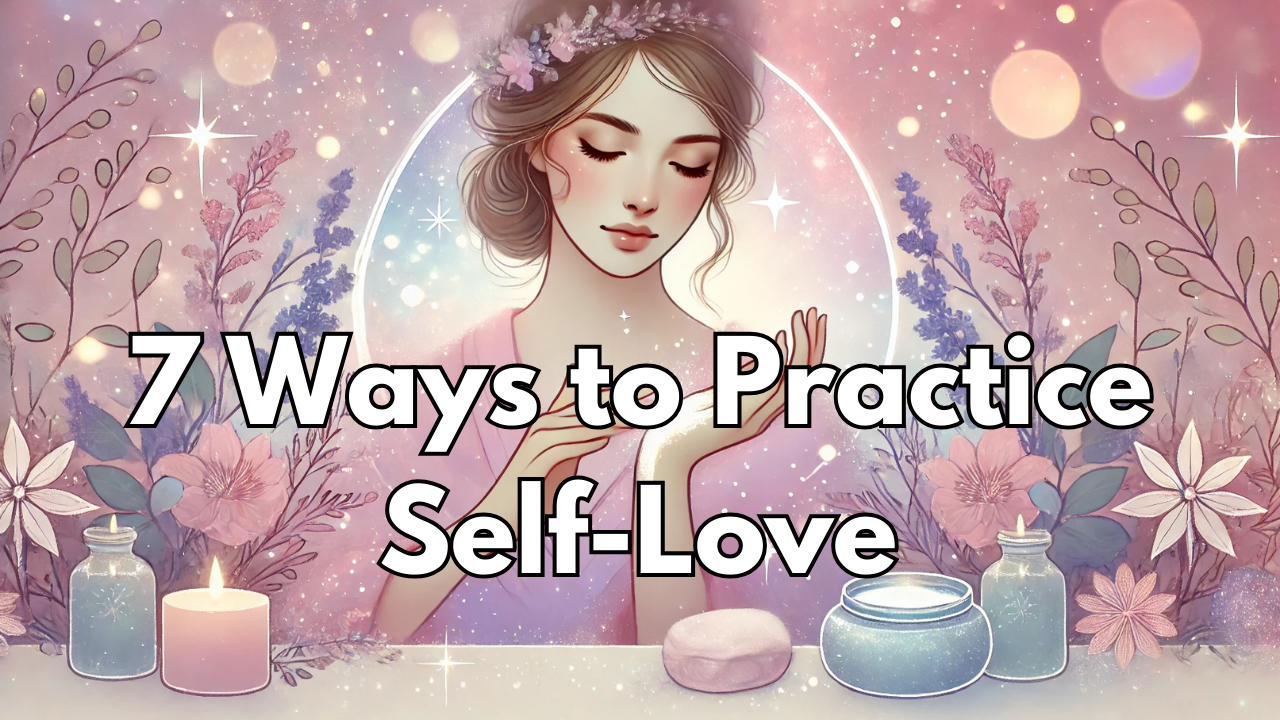7 Ways to Practice Self-Love: Nurturing Your Mind, Body, and Soul
Self-love is key to a happy life. It means valuing yourself and taking care of your health. The American Psychological Association says self-love is about being happy with yourself.
It's not just about treating yourself sometimes. It's about making self-care a part of your daily life. Studies show that activities like meditation can help with depression and stress.
Being kind to yourself is important for growing as a person. The Brain and Behavior Research Foundation says self-love comes from actions that help you grow. It's about seeing your worth and meeting your needs.
There are many ways to show yourself love every day. Mindful eating and spending time outdoors are good examples. Writing love notes to yourself and being creative also help.
Self-love is not selfish. It's a journey of learning and growing that improves your life. As you try different practices, you'll find what works best for you. This will help you on your path to happiness and fulfillment.
Understanding Self-Love: The Foundation of Personal Growth
Self-love is key to personal growth and well-being. It's more than a trend; it's a powerful tool for your mind, body, and soul. Let's explore what self-love means and why it's vital for your life.
Defining Self-Love and Its Importance
Self-love is about accepting and caring for yourself. It's about recognizing your worth and treating yourself with kindness. It's not selfish; it's a healthy way to face life's challenges.
The Psychological Benefits of Self-Love
Self-love boosts your mental health. It can lower depression, anxiety, and stress. When you love yourself, you're more likely to take care of yourself, like eating well and exercising.
Common Misconceptions About Self-Love
Some think self-love is selfish or vain. But it's really about recognizing your value and meeting your needs. Self-love means accepting yourself, flaws and all.
"Self-love is not so much about the ability to withstand loneliness or establish independence. It's about the ability to honor your authentic self."
| Components of Self-Love | Benefits |
|---|---|
| Self-acceptance | Improved self-esteem |
| Self-care routines | Better physical health |
| Self-compassion | Increased resilience |
| Body positivity | Enhanced body image |
| Self-acceptance affirmations | Positive mindset |
By embracing self-love, you set the stage for growth, better relationships, and a more rewarding life. Remember, loving yourself is a journey, not a destination.
Cultivating Self-Compassion: The First Step to Self-Love
Self-compassion is the base of self-love. It means being kind to yourself, even when things get hard. Dr. Kristin Neff says it has three main parts: self-kindness, feeling connected to others, and being mindful.
Studies show that self-compassion boosts well-being a lot. Over 1,000 studies prove it helps with mental health and reduces bad behaviors. Coaching can increase self-compassion by more than 60%, helping you grow.
Being self-compassionate means not judging yourself harshly for mistakes. It's okay to have flaws because we're all human. Here are some ways to practice self-compassion:
- Treat yourself like a close friend
- Take care of yourself when you're down
- Use positive words and affirmations
- Do mindfulness exercises to stay in the moment
Healing your inner child is also key to self-compassion. It's about caring for the vulnerable parts of you. This can heal deeply and increase self-love.
"Self-compassion is a powerful antidote to the negative effects of self-criticism and perfectionism."
Adding mindfulness to your day can boost self-compassion. It helps you notice your thoughts and feelings without getting lost in them. Regular mindfulness can make you more accepting of yourself and lower stress.
| Self-Compassion Component | Description | Benefits |
|---|---|---|
| Self-Kindness | Treating oneself with care during tough times | Reduced self-criticism, increased resilience |
| Common Humanity | Recognizing shared human experiences | Decreased feelings of isolation, increased connection |
| Mindfulness | Balanced awareness of thoughts and emotions | Improved emotional regulation, reduced stress |
By practicing self-compassion, you build a strong base for self-love and growth.
Embracing Your Feelings: Emotional Intelligence and Self-Love
Emotional intelligence is key to self-love. It helps us understand and manage our feelings. This way, we build a stronger bond with ourselves and others.
Recognizing and Validating Your Emotions
The first step is to acknowledge your feelings. This means noticing how you feel without judging. It's okay to feel happy, sad, angry, or anxious.
Accepting these feelings is important. It means seeing them as real, no matter how they make you feel.
Techniques for Processing Feelings Healthily
After recognizing your emotions, it's time to deal with them in a good way. Here are some methods:
- Journaling: Write down your thoughts and feelings to gain clarity.
- Physical activity: Engage in exercise or movement to release emotional tension.
- Mindfulness: Practice being present in the moment to observe your emotions without getting caught up in them.
- Positive self-talk: Use affirming language to support yourself through difficult emotions.
The Role of Emotional Intelligence in Self-Love
Emotional intelligence helps us love ourselves better. It lets us understand and care for ourselves. This way, we can make choices that feel right for us.
By improving emotional intelligence, we can take better care of ourselves. This leads to a more positive relationship with ourselves.
| Emotional Intelligence Component | Impact on Self-Love |
|---|---|
| Self-awareness | Recognizing personal strengths and areas for growth |
| Self-regulation | Managing emotions and reactions effectively |
| Motivation | Setting and pursuing meaningful personal goals |
| Empathy | Extending compassion to oneself and others |
| Social skills | Building supportive relationships and boundaries |
Adding emotional intelligence to our lives helps us love ourselves more. This journey is about learning and practicing every day. The benefits, like better self-esteem and happiness, are huge.
Setting Healthy Boundaries: Protecting Your Well-Being
Setting healthy boundaries is key to self-love. It means keeping yourself safe and focusing on your well-being. Many find it hard because of bad examples or fear of letting others down.
Good boundaries stop burnout and help you find who you are. You need to know what you need and say it to others. This is important for taking care of yourself and staying mentally healthy.
"Learning to love and accept yourself positively impacts setting healthy boundaries." - Dr. O'Neill
Studies show people with good self-esteem take better care of themselves. They don't judge themselves too harshly or compare to others. Setting boundaries is a big step in growing as a person.
| Benefits of Setting Boundaries | Challenges in Boundary Setting |
|---|---|
| Prevents burnout | Fear of disappointing others |
| Reduces anger and resentment | Guilt associated with saying "No" |
| Develops personal identity | Risk of losing social connections |
| Enhances self-esteem | Overcoming people-pleasing tendencies |
Remember, setting boundaries is a journey. It's okay to get help from a therapist if you're struggling. By focusing on your well-being, you're moving forward in your self-love journey.
7 Ways to Practice Self-Love: A Complete Guide
Self-love is key to feeling good about yourself. The American Psychological Association says it's about being happy with yourself. Let's look at seven ways to build self-love in your life.
Daily Affirmations and Positive Self-Talk
Positive affirmations can make you feel better about yourself. Start your day with kind words about yourself. This can change your mind to think more positively over time.
Prioritizing Self-Care and Personal Needs
Self-care is not selfish. It's important for your mind and body. Make time for things that make you feel good, like reading or enjoying a hobby.
Practicing Mindfulness and Self-Awareness
Mindful meditation helps you stay in the moment. It makes you more aware of your thoughts and feelings. This helps you understand yourself better.
Nurturing Your Physical Health
Exercise regularly to feel less stressed and healthier. Accept your body for what it can do, not just how it looks.
Cultivating Supportive Relationships
Be around people who support and uplift you. It's important to set boundaries to keep your mental health strong.
Pursuing Personal Growth and Development
Do things that challenge and inspire you. Learning new things can make you feel more confident and proud of yourself.
Celebrating Your Achievements and Strengths
Recognize your achievements, no matter how small. Celebrating your strengths helps you feel good about yourself and encourages you to grow more.
| Self-Love Practice | Benefits | Implementation Tips |
|---|---|---|
| Daily Affirmations | Boosts self-esteem | Start with 3 positive statements daily |
| Mindful Meditation | Increases self-awareness | Practice for 10 minutes each morning |
| Regular Exercise | Improves physical and mental health | Aim for 30 minutes of activity 5 days a week |
| Setting Boundaries | Protects mental well-being | Learn to say 'no' to unreasonable requests |
| Celebrating Achievements | Builds confidence | Keep a success journal to track progress |
Overcoming Self-Doubt: Building Confidence and Self-Esteem
Self-doubt can make us feel uncertain about ourselves. It affects our confidence and personal growth. But, there are ways to overcome it and boost our self-esteem.
Identifying and Challenging Negative Self-Talk
Negative self-talk is a big part of self-doubt. It's important to spot and fight these thoughts. Positive affirmations can change how we think about ourselves. Try saying "I'm capable of learning and growing" instead of "I can't do this."
Developing a Growth Mindset
Having a growth mindset helps beat self-doubt. Focus on growing personally, not comparing to others. See challenges as chances to learn and get better. This mindset can really help your confidence.
Strategies for Boosting Self-Confidence
Building self-confidence takes time and effort. Practice being kind to yourself and use affirmations every day. Think about your past successes to remember your strengths. Surround yourself with positive people and journaling can help you grow.
| Self-Doubt Manifestation | Strategy to Overcome |
|---|---|
| Imposter Syndrome | Acknowledge accomplishments |
| Self-Sabotage | Set realistic goals |
| Indecisiveness | Practice decision-making |
Remember, beating self-doubt is a journey. Be kind to yourself and celebrate small wins. If self-doubt is hard to shake, get professional help. With effort and the right tools, you can build lasting confidence and self-esteem.
The Impact of Self-Love on Relationships and Life Success
Self-love is key to a happy life and strong relationships. By focusing on self-care and setting boundaries, we build a strong base for growth and deeper connections. Studies show that those who love themselves more are happier in their relationships and life.
When we love ourselves, we don't need others for validation. This freedom leads to real relationships based on respect and understanding. Doing things we love and taking time for ourselves makes our relationships better.
The Balance app has meditations for self-love. These can boost our self-esteem, making us more confident and better at talking to others. By accepting our flaws and forgiving ourselves, we open up to learning and growing.
"Love is an action that is chosen, not just a feeling."
Choosing to love ourselves every day through positive thoughts and kindness helps us be better in our relationships. It lets us set clear boundaries, share our needs, and solve problems with empathy.
Building self-love is a journey that never ends. By always taking care of ourselves, we improve our lives and make our relationships more fulfilling.
Incorporating Self-Love into Your Daily Routine
Adding self-love to your daily life can change how you see the world and feel about yourself. A study found that 100% of people think starting the day with self-love makes them happier.
Creating a personalized self-love ritual
Begin your day with a purpose. 80% of people say starting with a positive thought sets a good mood. Here are some ideas for your self-care:
- Practice mindful meditation when you wake up
- Write down things you're grateful for
- Enjoy your morning drink slowly
Balancing self-love with other responsibilities
Self-love doesn't mean ignoring your duties. It's about finding a balance. 75% of people say writing down their goals helps them tackle tasks better. Try these tips:
- Make achievable goals for the day
- Take short breaks to think about yourself
- Speak kindly to yourself while you work
Overcoming obstacles to consistent self-love practice
Keeping up with self-love can be tough. Scott Daniels, from The Center, says it's key to make self-love a part of your life. Find activities that boost your self-esteem, like yoga or pottery. Remember, self-love means being kind to yourself, even when things go wrong.
"Each individual knows themselves best. Be curious and courageous in exploring what works for you."
By sticking to self-love, you're caring for your mind and body. Begin small, stay consistent, and see how self-love changes your life every day.
Conclusion: Embracing a Lifelong Journey of Self-Love
Self-love is a powerful force that changes lives. Studies show that those who practice self-compassion are 32% happier. This journey of self-discovery and growth improves relationships and boosts self-esteem.
It's important to embrace ways to practice self-love for personal growth. Setting healthy boundaries and celebrating small wins makes you stronger. In fact, 75% of people who prioritize self-care see big improvements in their self-worth and happiness.
Remember, self-love is a lifelong journey, not a destination. It means always practicing self-compassion and accepting yourself. As you keep going, your love for yourself will grow. This will positively impact those around you. Start this journey and see how it changes your life in amazing ways.

P.S. Whenever you’re ready, I would love to support you on your journey! There are currently 6 main ways Meraki Daydream can help you:
#1: Gratitude Journal Freebie:
Gratitude is the foundation of your mindful living journey. If you’re ready to start your daily gratitude practice, grab your free gratitude journal here.
#2: Shop Meraki Daydream for Intentional Fashion and Accessories:
Are you ready to channel your inner goddess and feel confident and empowered while turning daily activities into magical rituals?
#3: Manifestation Magic Potion Guide + Rituals:
If you’re confused by all the tips and tricks floating around the internet about manifestation, and you tried most of them with no results, this is for you.
In this guide, we demystify and debunk common manifestation myths and give you actionable instructions to help you actually achieve success on your manifestation journey.
#4: Spirituality and Self-Love Membership Community:
Tired of not seeing success on your spirituality, self-love and personal growth journey?
Join our spirituality and self-love membership where you can interact with an amazing community of like-minded people, and gain access to practical, actionable resources that have actually been helpful and effective for facilitating internal and external transformation on my personal journey.
#5: Mindful Business Membership Community:
Is your business putting you on the fast-track to burnout? The vibrant, growing community of like-minded people and the large array of actionable resources ensure that you have everything you need to be kind to yourself while growing your business sustainably.
Join our mindful business membership if you’re an entrepreneur who wants to adopt a more effective, but less exhausting approach to professional life.
#6: VIP Support in Both Memberships:
For each membership, you will be given the option to access VIP support, where I, Vansa, will personally assist you and give you feedback and guidance on your individual journey in an interactive group chat.
Just head over to the relevant membership and select the VIP option that suits you best.
Source Links
- 7 Ways to Nurture Your Mind, Body and Spirit for Vibrant Health by Kelley Grimes, MSW | #AspireMag - https://aspiremag.net/7ways-nurture-mind-body-spirit-vibrant-health/
- 7 Self Nurturing Activities for Inner Peace and Prosperity - Organic India - https://organicindiausa.com/blog/self-nurturing/
- Nourish Your Body, Nurture Your Soul: Self-Love & Self-Care - Be Well Bodyworks - https://bewellbody.com/nourish-your-body-nurture-your-soul-self-love-self-care/
- How to Love Yourself: Self Love for Beginners - Sage & Bloom - https://sageandbloom.co/how-to-love-yourself-self-love-for-beginners/
- What Does It Mean to Love Yourself? - https://psychcentral.com/health/what-is-self-love-and-why-is-it-so-important
- Self-Love and What It Means - https://bbrfoundation.org/blog/self-love-and-what-it-means
- What Self-Love Truly Means and Ways to Cultivate It - https://www.betterup.com/blog/self-love
- Embrace Self-Acceptance and Cultivate Self-Compassion- - https://changesbigandsmall.com/how-to-embrace-self-acceptance-and-cultivate-self-compassion/
- How to Practice Self-Compassion: 8 Techniques and Tips - https://positivepsychology.com/how-to-practice-self-compassion/
- Self Love and Emotional Intelligence - https://www.linkedin.com/pulse/self-love-emotional-intelligence-dr-rena-lyons-lxo8c
- Your Feelings Matter: How to Embrace Your Emotions - https://mike-robbins.com/your-feelings-matter/
- A Guide to Healthy Self-Esteem and Setting Boundaries. - https://medium.com/@doctorbecky/a-guide-to-healthy-self-esteem-and-setting-boundaries-c5f066ef0b42
- My Mental Health Ritual: Self-Compassion and Setting Boundaries - Talkspace - https://www.talkspace.com/blog/mental-health-ritual-self-compassion-boundaries/
- 7 Ways to Practice Self-Love - https://www.verywellmind.com/ways-to-practice-self-love-5667417
- How To Love Yourself: 7 Self-Love Tips You’ll Love | Fearless Living - https://fearlessliving.org/how-to-love-yourself-7-self-love-tips-youll-love/
- How to Overcome Self-Doubt - https://www.psychologytoday.com/us/blog/click-here-for-happiness/202205/how-to-overcome-self-doubt
- 8 Ways to Overcome Self-Doubt Once and for All - https://www.betterup.com/blog/overcoming-self-doubt
- How to Develop Self-Love & Strengthen Your Relationship - https://tinybuddha.com/blog/strong-relationships-stem-self-love-develop/
- Learn new ways to love yourself in a relationship - https://balanceapp.com/blog/how-to-love-yourself-in-a-relationship
- Self Love Morning Ritual — Murielle Marie - https://www.muriellemarie.com/blog/a-morning-ritual-for-self-love-in-five-easy-steps
- 5 Tips To Integrate Self-Love Practices Into Your Daily Routine - https://volumeone.org/sites/health/articles/2021/06/03/276895-5-tips-to-integrate-self-love-practices-into-your
- What Self-Love Is, Why It’s So Important and How to Make It Part of Your Daily Routine - https://www.success.com/why-self-love-is-important-and-how-to-practice-it/
- The Journey to Self-Love: Embracing Your Worth and Beauty - https://medium.com/@avalife/the-journey-to-self-love-embracing-your-worth-and-beauty-f6cd77b2362e
- Embracing the Journey of Self-Love: Nurturing Inner Happiness and Wellbeing - https://medium.com/@vasudhavmadaan/embracing-the-journey-of-self-love-nurturing-inner-happiness-and-wellbeing-e78dc807362d
- Self-love: A Compassionate Journey Within - Neighbors' Consejo - https://neighborsc.org/a-compassionate-journey-within/




 https://merakidaydream.com/pages/about-us
https://merakidaydream.com/pages/about-us

Share and get 15% off!
Simply share this product on one of the following social networks and you will unlock 15% off!